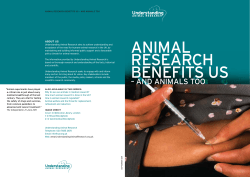
G-15 Joint Statement
GROUP OF FIFTEEN The Summit Level Group of Developing Countries Distribution: General ________________________________________________________ G-15 Joint Statement to the Sixty-Eighth World Health Assembly Geneva, 18th -26th May 2015 1. I have the honour to deliver this statement on behalf of the Group of Fifteen (G-15), a Summit Level Group of Developing Countries comprising 17 member states1, aimed for mutually beneficial cooperation and collaboration for realizing sustainable development and economic progress. 2. The emergence of the deadly Ebola outbreak in 2014 rang an ‘alarm bell’ for the global community, on the need to have a comprehensive and resilient preparedness, response and recovery mechanisms within global health systems, to address existing as well as emerging crises. The Ebola crisis demonstrated that health emergencies transcend man made borders and divisions on ‘developing’ and ‘developed’, and highlights the importance of coordinated global efforts to improve health systems at all levels. In this context, we hope that the ongoing work on the reform program within the World Health Organization (WHO) would facilitate in identifying and rectifying the existing implementation gaps to rapidly respond to any future challenges. As part of this process, we highlight the need of an effective and efficient coordination between all three levels of the organization, in order to ensure timely response, which will help in saving many lives. 3. The Group welcomes the timely discussion in this august assembly, on the theme “Building Resilient Health Systems”, and wishes to re-iterate its call for a coordinated and collaborative multistakeholder action, encompassing national, regional as well as global efforts. This would include sharing of experiences and expertise for capacity development and technology transfer in risk reduction, response and recovery; reducing health inequalities; to improve mitigation and management capacities, preparedness and timely response; ultimately accounting for a resilient health system. 4. While our primary focus should be in building the resilience in national health systems, efforts towards global preparedness for emergencies and disasters are critical. In this regard, we note the current discussions on the global health emergency workforce and the contingency fund, as agreed in the resolution adopted at the Special Session on Ebola. The Group believes this would facilitate the WHO and the international partners to better respond to health crises in a more timely manner, and looks forward for a consensus on the modalities of these processes. The Group is of the view that other possible outbreak emergence should also be given proper attention, in particular the reemergence of Polio threat. In this regard, the Group believes that the international community should continue its concerted efforts in addressing Polio, including by guaranteeing the availability of the affordable Polio vaccines for developing countries. 1 Algeria, Argentina, Brazil, Chile, Egypt, India, Indonesia, Iran, Jamaica, Kenya, Malaysia, Mexico, Nigeria, Senegal, Sri Lanka, Venezuela and Zimbabwe. 1 5. The model for a strong resilient system should be focused on the integrated health needs of the people at all levels and throughout their life-cycle, young and old, men and women, rural and urban, national and regional etc. In this approach, we note the importance of building effective and inclusive domestic health care systems in the first place, to facilitate the vital initial responses, including through robust dissemination of information on prevention as well as detection and treatment capabilities. The Group also emphasizes the importance of enhancing effectiveness of existing national health systems, particularly by ensuring adequate number of trained health workers, improved infrastructure, availability of quality, safe and affordable medicines and vaccines, reliable health information systems, investment in research and development and most importantly, sound health policies, as a primary responsibility of the States. 6. Fulfilling these key elements of a resilient health system cannot only be fully accomplished by the national efforts, as rightly noted in the UNGA resolution 69/132 ‘Global Health and Foreign Policy’, but requires global engagement, rooted in global solidarity and shared responsibility. In this regard, the Group underscores the importance of North-South, South-South and triangular cooperation as non-exclusive and complementary processes, that are founded on the exchange of best practices, as well as capacity-building and the transfer of technology on mutually agreed terms, to address the health inequities. 7. The Group notes with concern that the global health research and development (R&D) is currently not able to address and fulfill the priority health requirements of developing countries. This risks the health, wellbeing and development of many in the Global South. In order to implement the global commitments for an inclusive and equitable health care system for all, it is essential to overcome the failures of market dynamics in the production of life-saving medical products for diseases, which are disproportionately affecting the poor. In this regard, the Group wishes to highlight the importance of having globally agreed priorities in health related R&Ds, in line with the global health requirements, particularly for the poor and other vulnerable groups. We call the international community to consider new and innovative mechanisms to put in place for Global R&D that incorporate principles enunciated in the Consultative Expert Working Group (CEWG) report – (i) innovations systems that are based on open sharing of knowledge; and (ii) de-linkage of the cost of R&D from the price of final product. We also call the international community to collaborate in building developing countries capacities in order to carry out their own R&D and meet the specific local health needs of these countries. 8. Despite the significant advances in research and development of new potentially lifesaving medicines, the Group is deeply concerned on the increasing prices of some of these products that are critical to public health priorities. These reach markets at unaffordable levels for the majority in need, depriving access to quality medicines to the people in the Global South as well as, vulnerable segments within the developed countries, as recently demonstrated by new medicines for hepatitis C and cancer. In this context, the Group reiterates the need for urgent international policy space to facilitate equitable access to affordable, quality, safe and efficacious medicines, including generics, immunization services, safe vaccines and advanced medical technologies for combating diseases. In order to make access to medicines more equitable, reduce inefficiencies and curtail inappropriate and irrational use, medicines must be included and better integrated into public health systems. 9. The Group underscores that the public health needs of the developing countries will be best served if full use of the flexibilities available under the WTO TRIPS Agreement, 2 including the Doha Declaration on the TRIPS Agreement and Public Health are respected, made available and implemented. This would ease the cost of national governments in affording health care including medicines and vaccines, and for better implementation of the principle of universal health coverage. 10. The Group also expresses concern on the threats posed by increasing resistance to Antimicrobial drugs including multi-drug resistant Malaria, HIV and Tuberculosis, which are accelerated by excessive use of antimicrobials in animal feeds, inappropriate human use, and the lack of new and approved antimicrobial drugs and recalls that the challenge of combating antimicrobial resistance cannot be addressed by any country, or even region of the world, alone. There is an urgent need for collective action to ensure responsible use of antimicrobials in both human and animal husbandry and to reduce the burden of antimicrobial resistance in the environment. In this context, the Group recognizes that the countries with limited resources and vulnerable healthcare systems need particular help and attention from the international Community in strengthening antimicrobial stewardship and infection prevention and control, as well as in reinforcing cooperation in research & development investments. 11. The Group also wishes to underscore the importance of strengthening public health systems as both a health and a development goal, in order to address the health related priorities in an inclusive, people–centric, transparent and sustainable manner based on the principles of equity, and social justice, which will build on the progress achieved by States in realizing the MDGs. In this regard, the Group closely follows the ongoing negotiation on the post – 2015 development agenda, and believes that health and development must remain core principles of the agenda, as also underlined by the Open Working Group on Sustainable Development Goals in their proposals. 12. The Group is also concerned on the emerging and critical challenges of noncommunicable diseases (NCDs), which are closely linked to an array of socio-economic issues that are being disproportionately felt by developing countries. The Group underscores the importance of comprehensive multistakeholder strategies to address the NCD challenges, including policies and strategies to access affordable and equitable prevention, treatment and care. Regarding neglected tropical diseases, we underscore the term ‘neglected’ as these diseases disproportionately affect the poor, but have been long underserved. We therefore encourage the continued prioritization of these diseases in national as well as global health agendas, in order to prevent any conceivable catastrophes. 13. Finally the Group wishes to reiterate its firm recognition of WHO’s leading role in shaping global health policies and in engaging and coordinating global health partners. In this regard, we appreciate the efforts of the Director General Dr. Margaret Chan in leading the organization, and also notes the commitments as outlined in the ‘WHO Statement on the Ebola Response and WHO Reforms’ undertaken by the Director General and the Staff of the WHO, on the lessons learnt and the path defined for a stronger WHO. We hope that these commitments will be transpired in to action, enabling the WHO to emerge more effectively and stronger to be able to fulfill its mandate as the leading global health authority, for improved health outcomes. ***** 3
© Copyright 2025













